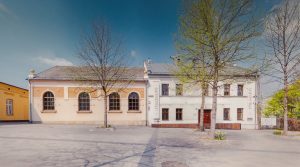Before war was declared between Israel and Hamas, the Centre for Israel and Jewish Affairs (CIJA) was busy planning a national conference on antisemitism in Canada.
The advocacy group is still planning to hold the conference on Oct. 16-17, but now it will have a new focus because of the fighting—and the potential repercussions for Canadian Jews.
The program for the ‘Antisemitism: Face It, Fight It’ conference in Ottawa is being adapted to take into consideration the changing situation in Israel, according to CIJA spokesperson Nicole Amiel.
“We are working to adjust the program to reflect our new reality,” she said in an email. “Some of the sessions will be tweaked as unfortunately, some of our speakers will no longer be able to join us. We will be sharing updates once everything is locked in.”
As for whether the conference should continue, in light of events in Israel, Amiel said “the answer is a resounding yes. Now more than ever, our community needs to come together, to feel unified and supported, and to feel like we can do something to fight antisemitism.”
For those worried about their safety while attending the conference, she indicated that “security is top priority. Our national security team is working with local community security and law enforcement to ensure we will be safe.”
About 1,000 people are registered for the two-day gathering, which will find them learning about and understanding the changing face of antisemitism today before returning home to put their knowledge into action.
A major concern to conference organizers is the rise of antisemitism, and other kinds of hate, on social media.
“Online hate is spreading,” said Shimon Koffler Fogel, president and CEO of CIJA. “We are still struggling to get a handle on that and how to push back against it.”
Through the conference, participants will be encouraged to find ways to confront hate on social media and build allyship with other groups also concerned about hate on the internet.
“It’s not enough to wring our hands,” he said. “We need to stand up and move from victim to empowered action.”
Participants will also be fanning out to visit politicians on Parliament Hill while in Ottawa, asking them to undertake a national campaign to promote social media literacy.
Such a campaign would be designed to teach Canadians what hate looks like online and how to deal with it, Fogel said. The campaign would address not just antisemitism but “anything that marginalizes or delegitimizes anyone.”
Conference participants will also ask politicians to expand and streamline the Security Infrastructure Program, which provides funding for equipment such as cameras and alarm systems as well as staff training for places of worship and other gathering places.
The “threat levels” today have changed, Fogel said, adding there is a need to provide extra security today.
Politicians will also be asked for Canada to expand its hate crime law to include instances when Israel is used as a proxy for the Jewish people in antisemitic rhetoric.
Criticism of the government of Israel is legitimate, Fogel said, but “anything that delegitimizes the nation of Israel as our ancestral homeland constitutes antisemitism.”
At a Tuesday evening gala, Irwin Cotler, former justice minister and attorney-general and Canada’s outgoing Special Envoy on Preserving Holocaust Remembrance and Combatting Antisemitism, will receive a lifetime achievement award for his work on behalf of human rights. Leaders of Canada’s main political parties are also expected to speak at the gala.
The conference is intended to empower people to fight hatred in Canada, Fogel said. “It’s not just a Jewish problem. All Canadians have to take part in addressing it.”
For more information, or to register, visit fightit.ca.







